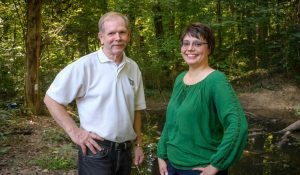
Jerry Walsh and Iglika Pavlova
Hands-on research is a powerful experience for undergraduates, with a huge impact on student success.
UNCG has been selected, among only 12 institutions nationally, to participate in the National Science Foundation-supported Council of Undergraduate Research (CUR) Transformations Project.
CUR Transformations is a four-year project that will support the development of undergraduate research in courses across the biology and chemistry curricula. As a result of the project, students in introductory through advanced courses will gain authentic scientific experience, and many of them will use the UNCG Wetlands as a living laboratory.
“UNCG is really leading a lot of efforts in student success, and this is another one of those efforts,” said Professor and Head of Biology Dr. Matina Kalcounis-Rüppell. “We’re adjusting our curriculum, using biology and chemistry and biochemistry as partner departments, so that more of our students have that experiential learning that we know makes a big difference in how successful they’re going to be.”
“It’s not just about creating a course,” explained lead investigator for the project, Dr. Iglika Pavlova, “but the way we see the curriculum.”
The UNCG Wetlands were installed in March of this year, restoring two areas on campus to a more natural and ecosystem-friendly state. As the habitats gain traction and attract wildlife and other forms of biodiversity, they are also becoming a nexus of biology and chemistry research.
Biology courses that will benefit from the CUR Transformations Project include introductory- to advanced-level courses that examine biodiversity in the wetlands, and courses in biogeochemistry. Among other projects, students will perform field measurements of mercury and devise approaches of lowering mercury levels in restored wetlands. Assistant Professors of Biology Dr. Martin Tsz-Ki Tsui and Dr. Zhenquan Jia also received a mini-grant from UNC GA to create an ecotoxicology research course for undergraduates.
Chemistry courses in the CUR Transformations Project include those in quantitative analysis, which will allow students to perform regular analysis of products of the natural environment.
“In the department’s chemical research, harvesting materials is common, but a research experiment in the living system is unique,” said Professor and Associate Department Head of Chemistry and Biochemistry Dr. Jerry Walsh. “Undergraduate research is something that’s very important for both of our departments. This project will open up the research experience to a wider range of students.”
Joint biology and chemistry projects will collect and analyze fungi that produce medicinal compounds from the wetlands and Peabody Park.
“Ultimately we’re using the strength of our research faculty,” said Pavlova. “At UNCG, we have highly successful researchers who are very involved in undergraduate education and research. And our graduates will represent the scientifically educated population of the future. With authentic scientific experiences, we’re exposing them to the kind of challenge and process it takes to do science and to discover how our world works.”
For information about the UNCG wetlands, contact Dr. Malcolm Schug at mdschug@uncg.edu.
By Susan Kirby-Smith
Photograph by Martin W. Kane
Visual: Dr. Jerry Walsh and Dr. Iglika Pavlova, l-r